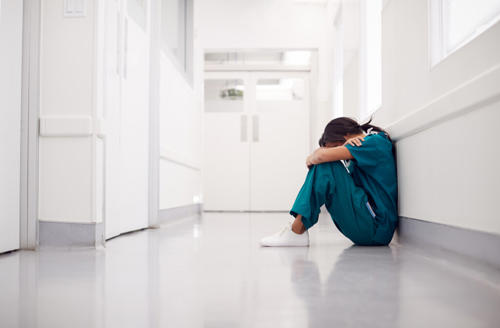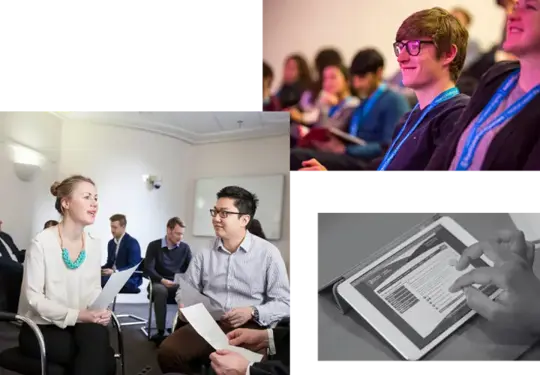Let us briefly draw a stark vignette of the scenario that a resident doctor starting to work for the NHS today may face.
They often spend much of their day job simply scribing and completing admin tasks, sometimes without even seeing patients. This acts as little or no training and only serves to demoralise previously well-motivated new doctors and medical students. Conversely, on call at night, the same people are suddenly left to their own devices; expected to carry risk alone, without having had such experience in the daytime when well supervised. This tends to leave them stressed and overstimulated, at risk of making poor decisions. At no point in or out of hours do they spend time at the midpoint of the stress / performance curve, which is optimal for learning, performance and job satisfaction. It is no wonder that this unfortunate dichotomy leaves them feeling unprepared for more senior roles.
Meanwhile, portfolio requirements are often ticked off with a minimum of constructive feedback, accompanied by infrequent meetings with supervisors who struggle to provide holistic support due to service pressures. Combined with frequent nights on call, this results in very little feeling of continuity and belonging. Outside work, autonomy is again lost as these residents struggle to plan the lives of their young family around rotas provided at short notice, barriers to flexible working and training bottlenecks – which offer minimal assurance about where it may be possible to work in future.

Resident doctors feel undervalued, under-supported and under-trained. They understand why patient safety and provision of care must remain crucial for the health service; however, they reject the idea that their own wellbeing, career progression and development as clinicians should be de-prioritised for good patient care to be achieved. In fact, a positive working and learning environment for residents is crucial to ensuring that the consultants and specialists of tomorrow are well motivated to continue working for the NHS and delivering world-leading medical care.
Enough talking: what have we done so far?
Following on from concerns about resident doctor training experience raised in the 2023 Shape of medicine report, the RCP decided to make 2025 the year of Next Gen and to create the Next Generation Oversight Group (NGOG).
The NGOG has provided a space for open and passionate debate about key topics affecting resident doctors today, including recruitment, generalism, alternative training pathways and flexible working. Crucially, around half the group are resident doctors, alongside senior members of RCP leadership, providing a rich forum for discussing frustrations and influencing RCP strategy. The above vignette is drawn from a combination of discussions held by the NGOG and the national 'next gen’ survey, which was completed by over 1,000 resident doctors. As we reach the final quarter of 2025, we can share some of the positive work of the NGOG, as well as where it should go in future – and how you can get involved.
Perhaps the most daunting and acute issue facing resident doctors today is the exponential increase in competition ratios for training posts. For internal medicine training (IMT), the post-to-application ratio has gone from around 1.4 in 2019 to 5.27 in 2025. We have reached a point where it is extremely challenging for many doctors to even get an interview for IMT, let alone a place on the programme. The NGOG has driven the RCP to advocate strongly on this topic, including via public position statements, discussion with government and a formal submission to the National Medical Training Review. We have been clear that it should never be the case that doctors need to spend multiple years out of programme simply to build a CV to get back in again. Such a system is entirely counterproductive and drives residents to consider other specialties, countries or even professions. At the same time, alternative pathways need to be made more uniform and straightforward to take some of the pressure off the application process.
Many residents feel that the application process is lacking in fairness and transparency. While looking for solutions to the recruitment challenges, one recurrent proposal has been the introduction of the Multi-Specialty Recruitment Assessment (MSRA) for IMT applications. However, the NGOG survey has shown clearly that this approach is not supported by the majority of residents. Hence, we have continuously rejected calls for its introduction. Should the MSRA be imposed despite reservations, then we will work to demand strict safeguards around its use, including a detailed review process.
Outside the regular formal meetings, the NGOG has provided a range of opportunities for resident doctor voices to be amplified when speaking on vital themes, including a series of blogs on topics such as outpatient experience, flexible training and mentorship. The culmination of this year’s work was an extremely well-attended and well-received next generation panel discussion, hosted by resident doctor members of the NGOG at the RCP’s annual conference, Medicine 2025. It provided a space for open discussion about where we stand, what needs to change and how we achieve this. Hopefully some of you reading this article were in attendance and felt inspired.
Our vision for the future
The challenge for the NGOG is to turn excellent discussions into concrete actions and strategy. The next year is an ideal moment for such action, given that many changes are on the horizon for resident doctors and the NHS as a whole. The 10 Year Health Plan for England will focus on shifting care to community, preventing ill health and implementing digital solutions. The NGOG needs to look in detail at the proposed changes and ensure that the RCP lobbies for prioritisation of resident doctor wellbeing and training during the reforms. A clear example is in workforce planning – the government has promised an increase in national training numbers, but the 1,000 proposed will go little way to addressing bottlenecks, and there is an enormous amount of nuance in ensuring that new posts are appropriately situated and adequately supported.
NHS England’s recent 10 Point Plan to improve resident doctors’ working lives sets out some key areas of improvement, which align with many of the concerns highlighted in the NGOG survey. It begins the process of holding trusts to account for achieving these goals. However, given the upcoming abolition of NHS England and myriad competing priorities, such as ambulance waits and corridor care, the RCP must continue this work and advocate for mechanisms to enforce good practice. Trusts must be incentivised to deliver good training in the same way that they are to provide good patient care. The NGOG must work on ways in which this can be achieved.

Get involved
There are many ways to contribute to the work of the NGOG – and doing so is an incredibly valuable and rewarding experience.
Jemima Sellicks, an IMT resident doctor at Northampton General Hospital, shared her experience:
‘Being part of the NGOG committee has given me and my fellow resident doctors a chance to actually make some change. We are all aware of the issues in postgraduate training in the UK; you hear the grumbles every day at work. But turning those frustrations into something constructive can feel impossible. Sure, on a local level we can push for little changes here and there, but there are underlying national problems that need big conversations with people who make the decisions.
‘That’s what the NGOG has offered. A chance for resident doctors to be heard. In my role as RCP East Midlands representative on the RCP Resident Doctor Committee (RDC), I’ve had aspiring IMTs come up to me asking how they can get into training. These are amazing doctors and yet they’re panicking about being unemployed next year. I try to help in small ways, but deep down I know that many won’t get jobs. It leaves me feeling pretty helpless.

‘I hope that, by being part of the RCP’s NGOG, we can push things forward and hopefully make things a bit better for the future.’
Jemima Sellicks
IMT resident doctor
If you are a resident doctor (whether in a training post or locally employed) and member of the RCP who would like to contribute towards the work of the NGOG, please let us know which issues you think we should be prioritising for discussion and advocacy in the coming year. If you are working on similar key issues in your local trust or health board, then please let us know – we may be able to invite you to present at an upcoming NGOG meeting. Similarly, if you have completed work that you feel is allied to the goals of the NGOG and would like to write a blog detailing your achievements, then please get in touch: NextGen@rcp.ac.uk.
Finally, there are regular appointments to the RCP RDC – if you are passionate about the future of physician training, then please consider applying! Read more in this edition of Commentary.








